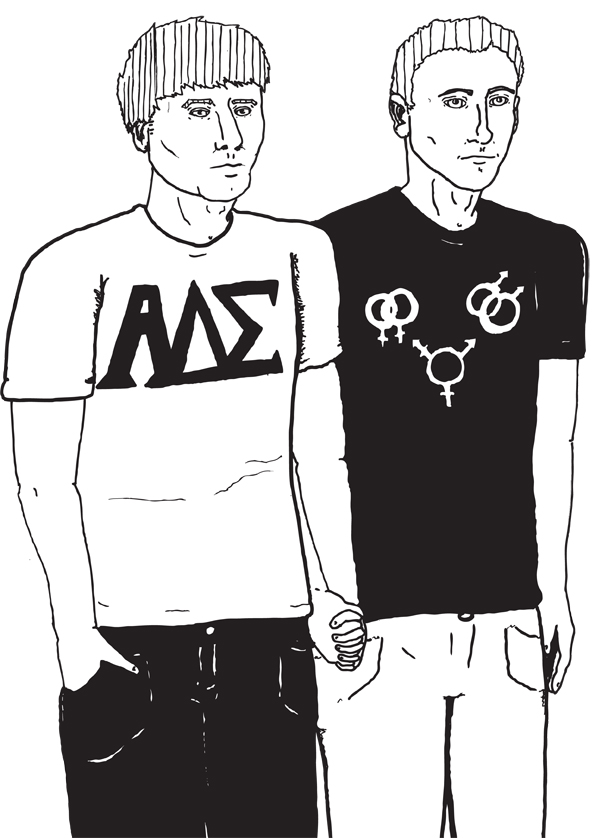Gay and Greek: How LGBTQ Students Navigate AU Fraternity Culture
November 18, 2010
Junior Tom McNutt experiences fraternity life at AU a little differently than most of his brothers. McNutt, a member of Sigma Phi Epsilon, is part of an increasingly noticeable group of AU students who have not historically been known to join the fraternity ranks, at least openly: gay men.
“There were some awkward conversations in the first week,” he said. “The best was one kid trying to tell me how to pick up girls, and I’m just sitting there in the corner, and everyone else knew, but he was still talking to me.”
McNutt knew many of the Sig Ep brothers before he rushed the fall semester of his sophomore year, and had already come out to them.
“They’re encouraging of my gay social life,” he said. “They want me to have a boyfriend and get out and have fun, and that’s just great. They’re not even just tolerant — they’re supportive.”
Doesn’t that strike you as a quintessentially AU story? At our bastion of social engagement and east coast liberalism, it’s totally cool for one of the bros to just dig dudes. Newsweek ranked AU as the sixth-most gay-friendly school in the country this past September, and openly gay fraternity brothers are visible on campus.
But we’re not perfect. Liberalism, the historically macho culture of fraternity life and a vocal LGBTQ community have proven a potent mix. McNutt has successfully navigated the two communities, and so have many other students. Not all of them though.
***
In fall 2009, a member of AU’s LGBTQ community was waiting on the LA Quad for a ride to a frat party with her friends.
“One friend went up and asked a frat brother if there was any chance that our group would get a ride soon,” she told AWOL in an email. “The brother responded by laughing and saying there was no chance. When we asked him why, he pointed at me and said ‘Well, I don’t even know what that is!’ My friends almost got into a fight with him and his brothers, but then we left.”
She tried to laugh it off, but was unable to shake his words. “I got really insecure about my presentation and was worried other people would read me as a man or as a ‘that,’ like he had called me,” she said. “I haven’t even tried to go to a frat since. The whole incident really colored my perception of Greek life, and of frat parties.”
Allegations of such scarring discrimination within fraternity life are few and far between — but this isn’t the only one, and a little bit goes a long way. Even a few incidents can lead to whispers, rumors and apprehensions that eventually paint a dark portrait of AU Greek culture.
These apprehensions aren’t new. When bisexual graduate student Leah Gates started her undergraduate career in 2005, she heard about brothers saying things like “Sorry, no room for dykes on this trip.” Even though nothing like this has ever happened to her or a friend, these stories had an impact. Gates, now about to finish graduate school, has never been to a fraternity party at AU.
Junior Carter Gibson, a brother of Delta Tau Delta, sits on the Interfraternity Council (IFC) as vice president. He identifies as gay and feels that AU fraternities are inclusive toward the LGBTQ community. He can attest: his sexual orientation has never been an issue for his fraternity brothers.
“They were curious about my sexuality and wanted to feel out how it impacted my personality, but were never disrespectful,” Gibson said. “Of course there are jokes made, but if they’re comfortable enough around me to make them, that makes me happy. They’re always careful to not cross the line.”
But do others cross the line?
***
This year during Welcome Week, an AU fraternity was hosting a party. A gay student in attendance claims he was asked to leave by a fraternity brother, who allegedly said “We don’t allow fags here.”
“At first, I stood there for a minute and didn’t understand what was going on,” the gay student said. “It took me a minute to comprehend, but after I started getting looks from a couple other brothers, I removed myself from the downstairs and told a few of my friends that I was leaving. After they heard the situation, they agreed to leave with me. Internally, I did not understand why I was not welcome, because this is American University.” AU, he said, was supposed to be “a school accepting of all individuals and all beliefs.”
The individual in question told AWOL that he never used the word “fags.” He also claimed he never kicked out the student, but threatened to do so if he continued making unwanted advances toward another male at the party. The student disputes this account, claiming he made no such advances.
The president of the fraternity adamantly denied that any wrongdoing occurred. He and the accused brother threatened to sue AWOL for libel when they were contacted about this article.
Freshman Tyler Toomey heard about such incidents, but he has found a way to still enjoy fraternity parties: “I’ve definitely decided that I would go with a close group of friends to frats that I don’t necessarily go to regularly just in case something were to happen.”
Even if Toomey is cautious, Carter Gibson still argues that AU Greek life is open and accepting.
“What I think is really cool about these stories even coming up is the fact that this kind of stuff happens so infrequently that these instances become such a big deal,” Gibson said. “Especially when we talk about what happened at that one fraternity party with someone being called a fag. The fact that I’ve been approached about this four or five times — it’s the only one that I’ve really been approached about — I think that shows how far and beyond our Greek community is, beyond so many other state schools, private schools; I would even go as far to say GW.”
Gibson acted as the interim president of the IFC for four months when the former president left AU. There’s certainly room for more tolerance within fraternity life, Gibson said, but he contends that AU fraternities have a lot to be proud of: “I really think it shows leaps and bounds that I’ve been in my leadership role for as long as I have, and the fraternity community allowed a gay man to essentially make all of their important decisions.”
***
One AU freshman was walking home with a boy from a fraternity party her second night on campus. About a quarter of the way back to her dorm, he decided to go back to the party.
“I mentioned my girlfriend and he was like ‘Oh, that’s really funny,’” she said. “Then he walked with me a little bit longer [and said], ‘I think I’m going to go back to the party now.’” Puzzled, she asked why he was leaving; he responded, “I’ll have better luck there.”
This illustrates what might be a bigger barrier to gay students’ participation in fraternity life: girls. It’s an issue that can manifest itself in every corner of the fraternity system. For example, getting rides to parties.
Sophomore Adam Powers has only been to a couple fraternity parties, but he finds the focus on getting girls ubiquitous.
“Lucky for me, I’m a cute little gay boy with tons of beautiful women friends to get rides with,” Powers said. “But that right there — that creates this assumption that the party is for my female friends and not for me, like I’m not the one that they actually want there.”
“It’s interesting because a lot of the time it gets heteronormative,” junior Eric Lynch of Pi Kappa Phi said. “A lot of the focus at parties is getting women. And you know, not all of us are there in order to meet women in terms of hookups and stuff.”
Lynch is another gay AU fraternity brother. He used to have a negative perception of fraternities, but decided to give Greek life a chance his sophomore year and rushed. “I was looking for brotherhood — it was always something that I was lacking,” he said.
He has been impressed by how accepting and open-minded his brothers have been, but he noted that at times they could be more conscientious with their word choice. Sometimes, brothers are told they “can bring girlfriends” to certain events, for instance.
With a social structure built on traditionally masculine ideals and norms, in which women become objects of sexual desire and a barometer of a party’s success, a guy who likes guys doesn’t always fit neatly into the system. That doesn’t mean that the system can’t adapt, but rather that it favors the interests — at least the romantic or sexual interests — of straight men over gay men.
Lynch’s experience perhaps best illustrates the intersection of gay and Greek at AU. Pi Kapp has given him the brotherhood he yearned for and overturned his preconceived notions, but when talk turns to girls and girlfriends, not all brothers remember boys and boyfriends.
“I could be more concerned about it,” he said. “But I’ve just come to accept it and realize that they do their best with trying to be more inclusive.” •
Illustration by Margaret Hayford.



